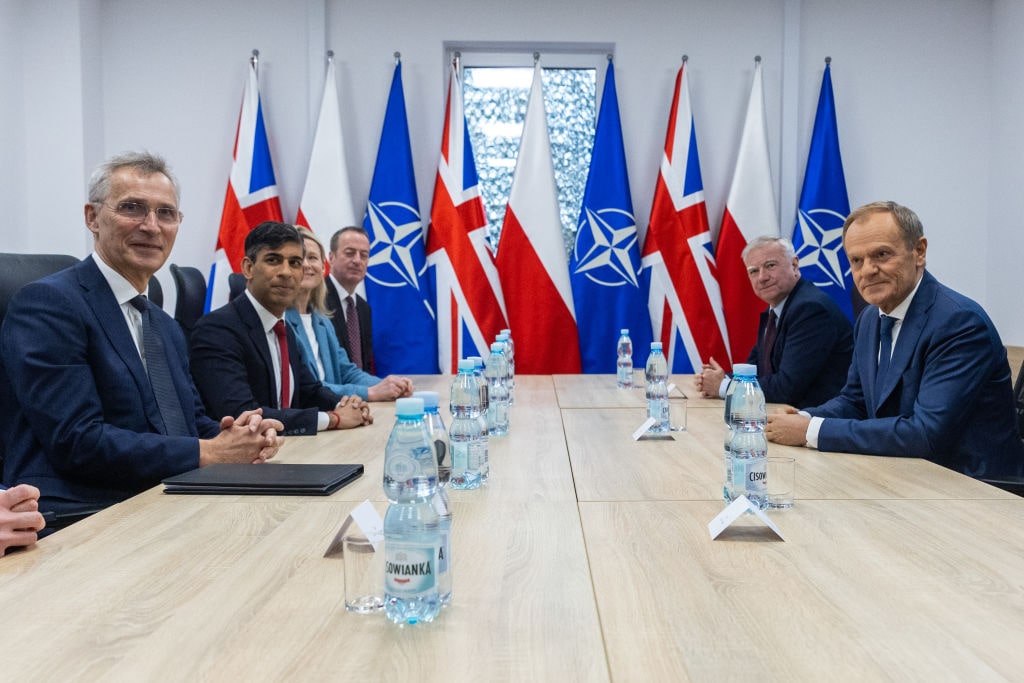Poland is ready for nukes. As a NATO country with many unfriendly neighbors, having a nuclear umbrella close at hand is clearly appealing. However, when it comes to nuclear arms, just having them available on your real estate is a controversial and tricky issue. This is particularly true for new NATO members. Russia is particularly sensitive about former Warsaw Pact countries gaining prominence in the Alliance.
Poland Stands as a Bulwark Against Russia
Sensibilities on this score would be particularly keen regarding Poland, which has become one of the stronger bulwarks against Russian adventurism among the newly matriculated Alliance members. The option of having atomic weapons on Polish soil does not suggest that Warsaw would have control or discretion in the use of the weapons. Instead, Poland would be another NATO nation as part of the nuclear sharing with a Dual-Capable Aircraft (DCA), conventional and nuclear, Polish Air Force. The timing for the Polish Air Force (PAF) is fortuitous since it will be integrating 32 DCA fifth-generation stealthy F-35A Lightning IIs in its inventory starting this year.
 Currently, seven Alliance member states possess DCA that could be used in a crisis: Germany, Italy, Netherlands, Turkey, Greece, and the United States. The United Kingdom and France have nuclear weapons with their own appropriate delivery systems. The nuclear sharing concept holds that NATO nations not possessing nuclear weapons have the opportunity to be part of the planning and employment of nuclear arms by contributing aircraft to deliver the weapons.
Currently, seven Alliance member states possess DCA that could be used in a crisis: Germany, Italy, Netherlands, Turkey, Greece, and the United States. The United Kingdom and France have nuclear weapons with their own appropriate delivery systems. The nuclear sharing concept holds that NATO nations not possessing nuclear weapons have the opportunity to be part of the planning and employment of nuclear arms by contributing aircraft to deliver the weapons.
Nuclear sharing and its place in NATO’s commitment to deterrence are integral to the Alliance’s Strategic Concept, which states:
“The Alliance is committed to ensuring greater integration and coherence of capabilities and activities across all domains and the spectrum of conflict, while reaffirming the unique and distinct role of nuclear deterrence. NATO will continue to maintain credible deterrence, strengthen its strategic communications, enhance the effectiveness of its exercises and reduce strategic risks.”
US forces in Poland number about 10,000. Nonetheless, the US military represents a commitment on the part of the US to maintaining the Polish military capability. Geographically, Poland is in a very advantageous position to provide defense for the Alliance. At the same time, its proximity to Russia and Moscow’s surrogates makes Poland vulnerable to an incursion by Kremlin forces. There is a roughly 40-mile strip of land that connects Poland to Latvia, Lithuania, and Estonia. “NATO planners have long feared that Russia could send forces from its Baltic enclave of Kaliningrad and Belarus to close the gap, thus separating the Baltic states from the rest of the Alliance,” Task and Purpose explained. Poland’s pivotal role in the Alliance’s defense against Russia and the threats that surround the country is not a recent epiphany.
Duda Ready for Nukes
As Polish President Andrzej Duda explained in an April 22 interview with the news outlet Fakt, talks regarding a more significant role for Poland in NATO’s mutual defense structure have been ongoing for some time. When asked about a possible nuclear sharing role for Poland, Duda answered (translated by Google):
“I have already talked about this several times. I must admit that when asked about it, I declared our readiness. Russia is increasingly militarizing the Königsberg district. Recently it has been relocating its nuclear weapons to Belarus. If our allies decide to deploy nuclear weapons as part of nuclear sharing also on our territory to strengthen the security of NATO’s eastern flank, we are ready for it. We are an ally in the North Atlantic Alliance, and we also have obligations in this respect.”
As expected, Russia has had something to say about the placing of nuclear weapons in Poland. Moscow is against it. In a threatening statement, Deputy Foreign Minister Sergei Ryabkov cautioned that “a further round of tension will occur. And in general, this game is very dangerous, its consequences may be hard to predict.” The threats from Moscow are not hard to predict, however. Russians having moved nuclear warheads into Belarus and positioned intermediate-range nuclear-capable missiles close to countries bordering Russia raises the hypocrisy flag on the Kremlin’s spokesman – consequently, his warning rings hollow.
The views expressed are those of the author and not of any other affiliate.




